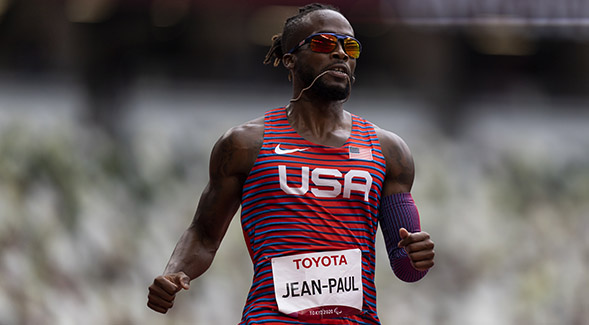Adapted Athletics Coach Brings Home the Bronze at Paralympics
Former All-American Isaac Jean-Paul jumped 6.93 meters in the long jump as a member of Team USA.

“God, show me that you’re real,” Paralympian and San Diego State University Adapted Athletics sprint coach Isaac Jean-Paul said, moments before taking a fateful last jump in the men’s long jump T13 competition at this year’s Paralympic Games in Tokyo.
Born with juvenile retinoschisis, a visual impairment, Jean-Paul has always excelled in sports. In high school, he was a stellar athlete in basketball, football and track. He was a five-time All-American for Lewis University in the high jump and an NCAA Division II indoor champion.
Frustrated and sitting in fourth place on Sept. 4, Jean-Paul had one last shot to make the podium on the world’s greatest stage. But he sensed something wasn’t right with the steps he was taking with his left foot.
“You’re too far ahead, move back two feet,” a Team USA sideline coach told him.
Jean-Paul took the two steps back — along with a leap of faith. “At that moment, when I had asked God, ‘Show me that you’re real,’ he, in my head, told me, ‘Isaac, trust,’” Jean-Paul said. “When that coach told me to move back two feet, trust came over me.”
Taking the advice and moving two steps back were crucial. His final jump: 6.93 meters, earning a bronze medal with just two centimeters to spare.
“Team USA is the hardest team in the world to make,” Director of SDSU Adapted Athletics Ahkeel Whitehead said. “Every standard is severely above every other country, so to make Team USA is already good. And then, to perform the way he did, it's just outstanding.”
“I just love seeing people that put in the work and are so deserving actually get the results because that doesn’t always happen,” he said.
For Jean-Paul, the years of training and a one-year COVID-19 delay finally were worth it.
“I literally came to a realization a couple of days ago that I’m part of a class of individuals that accomplished something that many people tried to accomplish, and that are still currently trying,” Jean-Paul said. “To be on that podium, I have to have pride.”
Time away
Jean-Paul said the COVID-19 hiatus, and some time away from the sport, led to some soul-searching that “really helped me understand a lot of things about myself” and how sports had become an outlet to overcome his visual impairment. The bronze medal also inspired confidence.
“In my head, I did win gold,” Jean-Paul said. “It’s definitely a humbling experience, a moment of gratitude, a moment of appreciation....God made that happen for me.”
Now, Jean-Paul is bringing his Paralympics experience from Tokyo to San Diego. As a coach for the SDSU Adapted Athletics team, Jean-Paul plays a pivotal role in giving students with disabilities a chance to thrive. The program, which consists of four athletes and six coaches, allows student-athletes an outlet to compete at the highest level.
And although Jean-Paul has been a sprint coach since 2019, his Paralympics experience has given him a new skill set that is crucial to the program’s mission. The first competitive collegiate adapted athletics program in California, SDSU Adapted Athletics strives to be a pipeline to Team USA.
“We want to develop everyone to their fullest ability,” Whitehead said. “But we have the resources to also say, ‘We can help you actually get to the games.’ There aren’t other programs that are trying to help athletes with that second part of reaching the highest level by making the national team and competing in the world championships or Paralympic games.”
A new passion
Through coaching, Jean-Paul has found his passion: inspiring other athletes to follow their dreams. His extensive knowledge about the sport coupled with his experience at the highest level gives his athletes a competitive advantage both physically and in their mental game.
Each time he steps on the track, Jean-Paul is taking strides to change the narrative around individuals with disabilities, and to find himself in the process.
“I always tell people I run for change and I jump for change,” Jean-Paul said. “Every time I compete, I feel like that’s an opportunity to show the world my story, my passion and why I do this.”
“It’s bigger than just a sport because this sport taught me more about myself, more about life than just learning how to run or jump over a bar,” he said. “It taught me how to love myself.”



